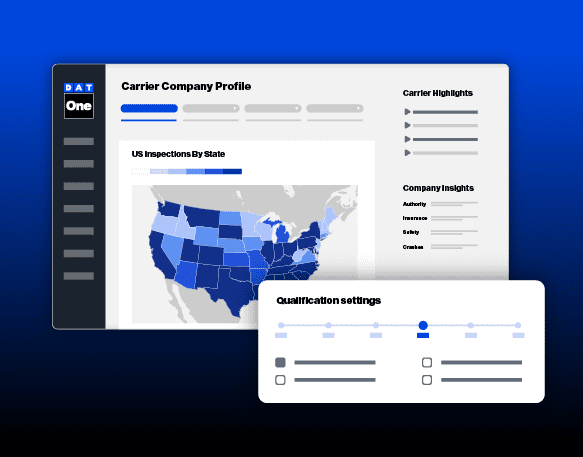But there are some key differences that make answering the question of “What is a freight forwarder vs broker” a bit more complicated.
Read on to learn more about what distinguishes a freight broker vs. freight forwarder so you can determine which position best fits your professional interests.
What is a freight broker?
A freight broker acts as a facilitator and negotiator between the two parties involved in getting freight from point A to point B: shippers and carriers. Thanks to the relationships brokers have with both parties, they offer unique advantages that shippers and carriers are unlikely to achieve if trying to connect on their own.
Because brokers connect with multiple carriers, they can often get better rates for shippers and they tend to have more bargaining power than individual businesses trying to negotiate for themselves. Additionally, because brokers work with multiple shippers, they can offer carriers a steadier supply of loads than they are likely to find on their own. That makes it easier to keep their trucks full and on the road while reducing their deadhead miles.
Freight brokers only serve as intermediaries between shippers and carriers. They never handle the freight themselves. But that doesn’t mean their role exclusively involves serving as middlemen and negotiating rates. In addition to those essential roles, freight brokers also track shipments, alerting both carriers and shippers of any changes or delays, and they help maintain smooth, open communication between both parties.
Freight brokers earn money by taking a small commission on the cost of each transaction they handle.
The benefits of a freight broker
For carriers and shippers, there are a number of advantages that come with using a freight broker that mean they might choose to work with one over trying to find freight on their own or using a freight forwarder. These benefits include:
- Brokers keep tabs on the industry, tracking freight and fuel rates, regulations, emerging trends, and more, which they can then share with shippers and carriers.
- Since brokers deal in large freight volumes, they can negotiate better rates for both parties.
- Brokers can help optimize shipping to make carriers more profitable, reducing route inefficiencies and increasing delivery accuracy and safety. After all, the more profit a carrier makes, the more profit the broker gets.
- Brokers can handle the insurance claims process for carriers if shipments are lost or damaged.
In short, freight brokers simplify the lives of both shippers and carriers, making them an invaluable part of the trucking industry.
What is a freight forwarder?
While a freight broker never handles the freight directly — freight forwarders actually take possession of the shipment, often storing, packing, and shipping it themselves under their own operating authority. That means they have a lot more responsibility for the goods that get shipped than a broker does.
Freight forwarders need to be licensed under the Federal Motor Carrier Safety Administration (FMCSA) for both interstate and foreign commerce — brokers only need to register with FMCSA for their brokerage authority. With that license, freight forwarders can ship freight more widely under their own bills of lading than a broker can.
Given that freight forwarders handle shipments themselves, the role is much more hands-on than being a freight broker. Because freight forwarders store freight, they are also responsible for insurance. Additionally, even though freight forwarders don’t actually transport freight themselves, they arrange and coordinate that transportation in a much more direct and physical way than freight brokers.
Generally speaking, freight forwarding is a more specialized job with many of its own legal requirements, making it a harder space to get started in than freight brokering.
The benefits of a freight forwarder
Like freight brokers, freight forwarders have specific responsibilities that benefit the carriers and shippers that use them. Those benefits can make certain carriers and shippers more interested in working with a freight forwarder. They include:
- Breaking up or consolidating goods in storage.
- Packaging and routing freight in unique ways that saves on shipping costs while ensuring the cargo is shipped both safely and on time.
- Handling customs as well as international export and import issues.
- Taking care of packaging or teaching customers how to best package their products in situations where there’s higher damage potential during shipping.
- Facilitating proper labeling to ensure every package is delivered where and when it needs to be. In cases of international shipment, that can include things like labeling the exact contents of the shipping container, if there are hazardous items, the actual weight of the container, the country of origin, the details of the port of entry, and any other details that might be needed (all in the language of the destination country).
- Preparing key paperwork like the bill of lading, commercial invoice, and, in international shipping situations, the certificate of origin and inspection certificate.
Thanks to all these benefits, freight forwarding is an attractive option for many businesses.
What are the differences between a freight forwarder vs. broker?
There’s one key difference between freight forwarder and broker work: while both parties facilitate the connection between the shipper and the carrier, a freight broker never takes physical possession of the freight while a freight forwarder does, often storing, packing, and even shipping that freight. A freight broker simply manages shipments. They also typically don’t handle international shipments, while freight forwarders do thanks to their unique licensing.
Because freight forwarders have to do so much more in their roles, they require a lot more than a broker does. A broker just needs authority and a load board to find freight. A freight forwarder needs those things too, but they also need warehouses, packing supplies, trucks, and, often, personnel in order to keep their business afloat.
There’s also a difference between a freight forwarder vs broker when it comes to responsibility. While a freight broker pays the carrier, the carrier is still the one responsible to the shipper for the items. A freight forwarder, on the other hand, is responsible to the shipper while the carrier is responsible to the forwarder. The carrier is not directly responsible to the shipper.
That impacts the legal responsibility that comes with each position. Since freight brokers never take physical possession of the actual freight, they are never legally responsible for it. On the other hand, as soon as a freight forwarder takes possession of freight, they are immediately responsible for the storage, shipment, and delivery of that cargo. They assume legal responsibility for the load and for its condition and, as a result, freight forwarders have much stricter government licensing and insurance requirements than brokers. Meeting those requirements can be costly.
Choosing between a freight broker and freight forwarder
If you’re interested in entering the trucking industry and you’re trying to decide whether freight brokering or freight forwarding might be the right path for you, it’s important to ask yourself what exactly you’re looking to do in your position. Do you want to interact directly with freight, handling storage and shipments? Are you ok with the stricter government licensing and insurance requirements and the accompanying costs? If the answer to both those questions is yes, then freight forwarding might be a good path for you.
However, for most people, freight brokering is a better path — especially at the beginning of their career. Freight brokers have far fewer requirements to meet. If you’re interested in playing an essential role in the domestic shipping industry and you like working with people (and you’re ok with staying hands-off when it comes to the freight itself), freight brokering might be a great choice for you. All you need to become a freight broker is get your broker authority and get access to a top-quality load board that can help you build relationships with shippers and carriers alike.
At DAT, we have everything you need to get started as a freight broker. Our experts will guide you through the entire process of getting broker authority. We’ll even fill out your paperwork so you can be sure that it’s right the first time so you’ll be ready to start your business in no time. Once you have your authority, our broker load boards are ready and waiting to connect you to the best shippers and carriers in the industry. As the largest load board in the industry, there’s always something new to find with DAT.
If you want to learn more about how DAT can help you become a freight broker, check out all our broker services today.
Step back and let DAT handle your paperwork!
Becoming a broker can be a lengthy process — especially if you don’t know what you’re doing. A single mistake in your paperwork can significantly set you back. Luckily, DAT Authority can deal with your paperwork and help you navigate any complexities.
Sign up today to get started!




